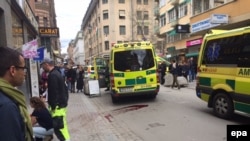Tashkent washes its hands of radicalized Uzbeks
| Publisher | Radio Free Europe/Radio Liberty |
| Publication Date | 2 November 2017 |
| Cite as | Radio Free Europe/Radio Liberty, Tashkent washes its hands of radicalized Uzbeks, 2 November 2017, available at: https://www.refworld.org/docid/5a9fc6496.html [accessed 27 May 2023] |
| Disclaimer | This is not a UNHCR publication. UNHCR is not responsible for, nor does it necessarily endorse, its content. Any views expressed are solely those of the author or publisher and do not necessarily reflect those of UNHCR, the United Nations or its Member States. |
November 02, 2017 16:07 GMT
Tony Wesolowsky
 Emergency services help the injured near the scene where a truck crashed into a department store in central Stockholm in April. An Uzbek man has been charged with deliberately ramming the shop, killing four people.
Emergency services help the injured near the scene where a truck crashed into a department store in central Stockholm in April. An Uzbek man has been charged with deliberately ramming the shop, killing four people.
Tashkent was quick to react after an Uzbek immigrant was accused of killing eight people in a truck attack in New York earlier this week.
But while President Shavkat Mirziyoev quickly expressed Uzbekistan's willingness to use "all its resources" to help investigate the October 31 attack, observers continue to scrutinize Tashkent's response in light of the country's history of repression of Islam at home.
Uzbek officials have not only defended their policies, but credited them with helping to wipe out radicalism at home, noting that Sayfullo Saipov, like other Uzbeks accused of terrorist attacks this year, were radicalized outside the country.
"I don't believe the conditions exist inside the country for these Uzbeks to have been radicalized," Abdulaziz Mansur, deputy head of Uzbekistan's Muftiat, the state body that oversees the country's Muslim community, told RFE/RL's Uzbek Service on November 1.
"The Uzbek youth who are carrying out these types of attacks, killing innocent people in foreign countries, they believe in the wrong ideas. They've been poisoned with false ideas by groups related to Islamic State in Syria, Iraq, Turkey, and other countries," Mansur continued.
Series Of Terrorist Attacks
Prosecutors have charged Saipov, 29, with using a rented pickup truck to run down civilians on a bike path in Manhattan in carrying out the bloodiest attack in New York City since hijacked airliners slammed into the World Trade Center on September 11, 2001.
Troubling for Tashkent was the fact it was at least the fourth attack abroad this year blamed on an ethnic Uzbek or Uzbek national.
On New Year's Day, an Uzbek gunman allegedly burst into a nightclub in the Turkish city of Istanbul and killed 39 people. In April, an ethnic Uzbek man born in Kyrgyzstan allegedly blew up a subway train in the Russian city of St Petersburg, killing at least 14 people, and that same month an Uzbek man is accused of ramming a truck into a crowd in Stockholm, killing four people.
Wary of radicalism, Tashkent has tightly controlled and restricted religious practices in the mainly Muslim country since the breakup of the Soviet Union in 1991.
The ostensible point of all the curtailments was to combat the Islamic Movement of Uzbekistan, a jihadist movement that appeared shortly after the collapse of the Soviet Union in 1991.
All clerics need government approval; all madrasahs are government controlled. Even the growing of a beard, like the one groomed by Saipov, is outlawed in Uzbekistan. The reason? They are a sign of religious extremism.
Escaping Uzbekistan
The regime of Islam Karimov, who ruled the country with an iron fist for more than two decades until his death last year, outlawed Islamist political parties and hunted down religious activists.
Facing such restrictions plus poor job prospects, millions of Uzbeks have emigrated in recent years, especially to Russia.
But abroad, many struggle with a new culture and language, leaving some frustrated and susceptible to extremist influence, experts say. "I think that fact of migration is relevant to this case and the other cases [of Uzbek-linked terrorism]," Steve Swerdlow, Central Asia researcher at Human Rights Watch (HRW), told the Democracy Now podcast on November 2.
President Mirziyoev has vowed to open his country after decades of authoritarian rule under Karimov. But these recent attacks with an Uzbekistan link now pose a challenge to the first-year leader.
"I think you are already seeing a greater level of acknowledgement than we saw under the Karimov administration; I cannot imagine had this happened two years ago that Karimov would have put out a statement like Mirziyoyev did," Edward Lemon of Columbia University's Harriman Institute says.
"Uzbekistan remains authoritarian and to expect the government to put up its hands and accept any guilt is a little optimistic! But I think their response was a start," Lemon says in an e-mail response.
HRW recently welcomed steps taken by Mirziyoev during his first year in office to improve the country's human rights situation.
HRW said that since assuming the presidency in September 2016, "the Uzbek government has released at least 16 political prisoners, relaxed certain restrictions on free expression, removed citizens from the security services' notorious 'black list,' and increased the accountability of government institutions to citizens."
"The test for Tashkent is to turn positive moves into enduring structural improvements," Swerdlow wrote in the report based on a fact-finding mission inside Uzbekistan, a first after the NGO was kicked out in 2010 and only recently readmitted.
HRW has also commended Mirziyoev for his willingness to acknowledge the persistence of human rights abuses, even on the international stage.
Link to original story on RFE/RL website
